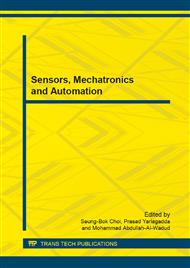[1]
Lorenz EN. Deterministic non-periodic flow. J Atmos Sci 1963; 20: 130–41.
Google Scholar
[2]
W. Tucker, The Lorenz attractor exists, C. R. Acad. Sci. Paris, Ser. I Math. 328 (1999) 1197–1202.
Google Scholar
[3]
Ge SS, Wang C, Lee TH. Adaptive backstepping control of a class of chaotic systems. Int J Bifurcat Chaos 2000; 10: 1149–56.
DOI: 10.1142/s0218127400000815
Google Scholar
[4]
Wang C, Ge SS. Adaptive backstepping control of uncertain Lorenz system. Int J Bifurcat Chaos 2001; 11: 1115–9.
DOI: 10.1142/s0218127401002560
Google Scholar
[5]
Yang S, Chen C, Yau H. Control of chaos in Lorenz system. Chaos, Solitons & Fractals 2002; 13: 767–80.
DOI: 10.1016/s0960-0779(01)00052-2
Google Scholar
[6]
Gao F, Liu WQ, Sreeram V, Teo KL. Nonlinear feedback control for the Lorenz system. Dyn Contr 2001; 11: 57–69.
Google Scholar
[7]
Bai EW, Lonngren KE. Synchronization and control of chaotic systems. Chaos, Solitons & Fractals 1999; 10: 1571–5.
DOI: 10.1016/s0960-0779(98)00204-5
Google Scholar
[8]
Chen, G. & Ueta, T. Yet another chaotic attractor, Int. J. Bifurcation and Chaos 1999; 9,; 1465-6.
DOI: 10.1142/s0218127499001024
Google Scholar
[9]
Jinhu Lü , Suochun Zhang. Controlling Chen's chaotic attractor using backstepping design based on parameters identification. Physics Letters A 2001; 286; 148–152.
DOI: 10.1016/s0375-9601(01)00383-8
Google Scholar
[10]
Jianwen Feng , Chen Xu, Jianliang Tang. Controlling Chen's chaotic attractor using two different techniques based on parameter identification. Chaos, Solitons & Fractals 2007; 32 ; 1413–1418.
DOI: 10.1016/j.chaos.2005.11.045
Google Scholar
[11]
Lü, J. & Chen, G. A new chaotic attractor coined, Int. J. Bifurcation and Chaos 2002; 12; 659-661.
DOI: 10.1142/s0218127402004620
Google Scholar
[12]
Yu, Y. & Zhang, S. Controlling uncertain Lü system using backstepping design, Chaos, Solitons & Fractals. 2003; 15,; 897-902.
DOI: 10.1016/s0960-0779(02)00205-9
Google Scholar
[13]
Wu X, Lu J. Parameter identification and backstepping control of uncertain Lü system. Chaos, Solitons & Fractals 2003; 18: 721–9.
DOI: 10.1016/s0960-0779(02)00659-8
Google Scholar
[14]
Lü J, Lu J. Controlling uncertain Lü system using linear feedback. Chaos, Solitons & Fractals 2002; 17: 127–33.
DOI: 10.1016/s0960-0779(02)00456-3
Google Scholar
[15]
Faqiang Wang, Chongxin Liu. Synchronization of unified chaotic system based on passive control, Physica D 2007; 225; 55–60.
DOI: 10.1016/j.physd.2006.09.038
Google Scholar
[16]
Jinhu Lü, Guanrong Chen, Daizhan Cheng, Sergej Celikovsky. Bridge the gap between the Lorenz system and the chen system. Int J Bifurcat Chaos 2002; 12; 2917-2926.
DOI: 10.1142/s021812740200631x
Google Scholar
[17]
Li D, Lu J, Wu X. Linearly coupled synchronization of the unified chaotic systems and the Lorenz systems. Chaos, Solitons &Fractals 2005; 23: 79–85.
DOI: 10.1016/j.chaos.2004.03.027
Google Scholar
[18]
Gao Xin, Liu Xing-Wen. Delayed fuzzy control of a unified chaotic system. Acta Phys . Sin. 2007; 56; 0084-07. (in Chinese).
DOI: 10.7498/aps.56.84
Google Scholar
[19]
M.T. Yassen. Chaos control of chaotic dynamical systems using backstepping design. Chaos, Solitons and Fractals 2006; 27; 537–548.
DOI: 10.1016/j.chaos.2005.03.046
Google Scholar
[20]
S.H. Mahboobi , M. Shahrokhi , H.N. Pishkenari. Observer-based control design for three well-known chaotic systems. Chaos, Solitons and Fractals 2006; 29; 381–392.
DOI: 10.1016/j.chaos.2005.08.042
Google Scholar
[21]
Jie Liu, Shihua Chen, Jin Xie. Parameter identification and control of uncertain unified chaotic system via adaptive extending equilibrium manifold approach. Chaos, Solitons and Fractals 2004; 19; 533–540.
DOI: 10.1016/s0960-0779(03)00105-x
Google Scholar
[22]
Changchun Hua , Xinping Guan , Peng Shi. Adaptive feedback control for a class of chaotic systems. Chaos, Solitons &Fractals 2005; 23; 757–765.
DOI: 10.1016/j.chaos.2004.05.042
Google Scholar
[23]
Tsung-Ying Chiang, Meei-Ling Hung, Jun-Juh Yan, Yi-Sung Yang, Jen-Fuh Chang. Sliding mode control for uncertain unified chaotic systems with input nonlinearity. Chaos, Solitons and Fractals 2007; 34; 437–442.
DOI: 10.1016/j.chaos.2006.03.051
Google Scholar
[24]
Bing Chen, Xiaoping Liu, Shaocheng Tong. Adaptive fuzzy approach to control unified chaotic systems. Chaos, Solitons and Fractals 2007; 34; 1180–1187.
DOI: 10.1016/j.chaos.2006.04.035
Google Scholar
[25]
Tornambe A, Valigi P.A. A decentralized controller for the robust stabilization of a class of MIMO dynamical systems. Measurement, and Control 1994; 116; 293-304.
DOI: 10.1115/1.2899223
Google Scholar


